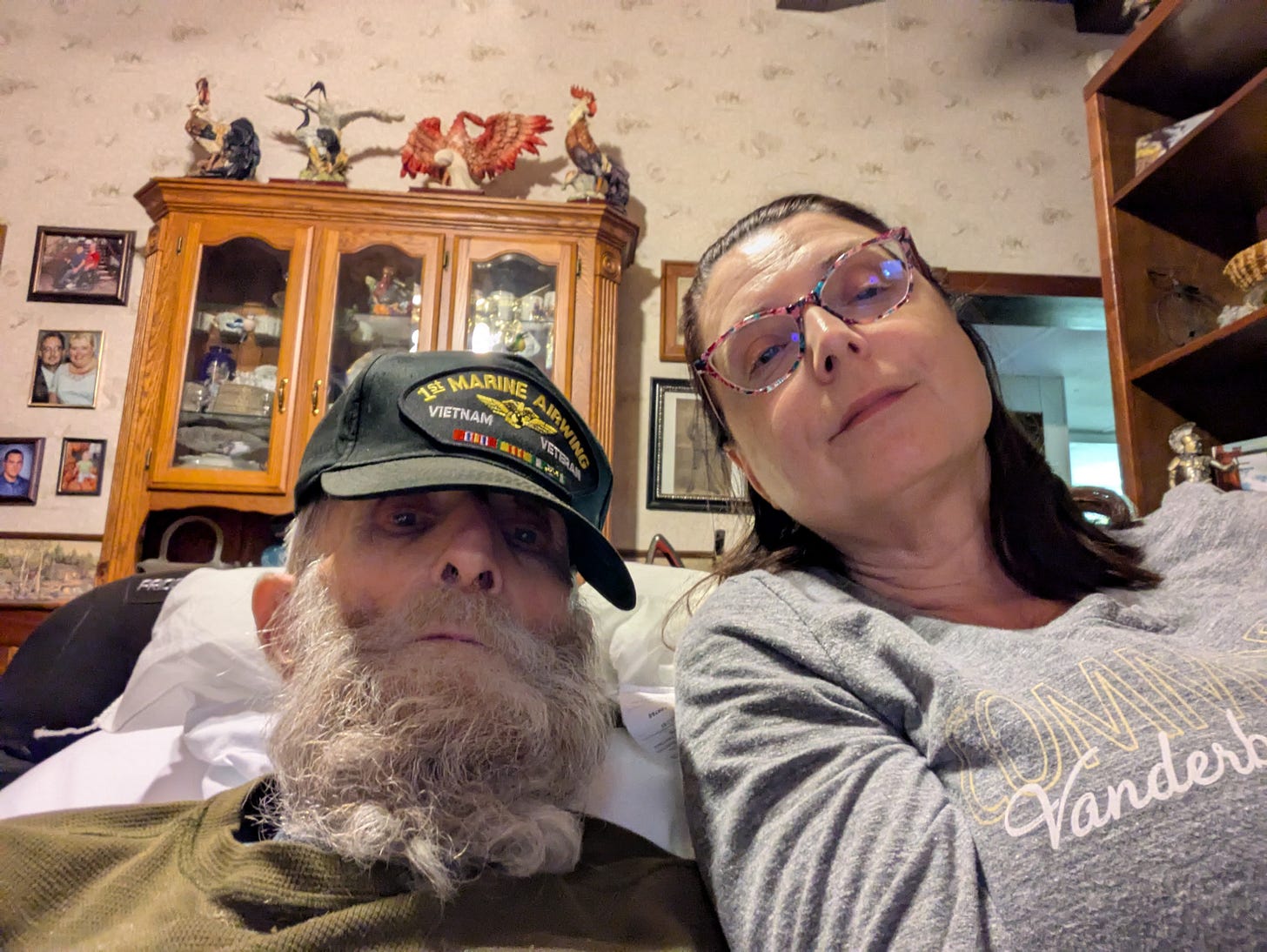There has been a lot of talk recently about Medicaid and Disability programs and the desire by some politicians to enact work requirements for some people to continue receiving benefits. They make it sound like disabled people are lazy and don’t want to work, so they sit around and collect poverty level payments and sub-optimal healthcare via Medicaid from the government. Like we all aspire to a subsistence level existence.
You may recall reading my writing on disability and poverty in previous posts. You probably know that I am a disabled person. After two heart transplants, a couple strokes, and a condition called Coronary Artery Vasculopathy (CAV) which is a hardening of the arteries that only affects transplanted hearts and will eventually lead to my death, I qualify for permanent disability.
The good news is that I’m not stuck in a bed all day every day with a required caregiver. On my good days, I can do pretty much whatever I want, within reason. On my bad days, I can barely get out of bed and get dressed, unless I push myself beyond my limits, resulting in a guaranteed very bad day the next day.

I like to think of myself as cell phone with a faulty battery. Some nights, I hook myself up to the charger and wake up with my battery at 100%. Of course, if I try to run too many apps, it’s going to run down my battery really fast and I’m going to shut down before the end of the day. Other days, my battery doesn’t seem to charge at all overnight, and I need to minimize the apps I run the next day, so I don’t shut down too soon.
Because I’m not chained to the confines of a cubicle of a 9-to-5 job, I have the freedom to use my limited battery charge as I decide. This also means I have the flexibility to come down to take care of my father for the past month, although this does require careful planning.
Twice a day, I take anti-rejection medication that makes me loopy, like three-martini lunch inebriated. I can’t drive straight through from my home state to his. It’s a 9-to-10-hour drive, and I take my meds at lunchtime and before bed. It takes about 4 hours for the effects of the meds to wear off, so I never have a clear 10-hour window to make the drive.
My options are either to fly, if I’m traveling alone, or have my husband drive me. I can drive part of the way, taking turns behind the wheel, but I can’t make the full trip alone.
Taking care of my father isn’t extremely hard work. I feed him, sort his meds and make sure he takes them, and clean up around the house. These activities aren’t much different than I would do at my own home. Cooking, cleaning, and lots of napping. I also drive him in his handicap van on short trips to doctor appointments or out to eat sometimes. These are all things within my ability.
Since I’ve been down here for the past month or so, I’ve had some bad days where I didn’t even get out of my pajamas. This nonstop rain has had my body stiff and aching and hardly able to move. On those days, we watched old movies on TV and ate sandwiches. I didn’t cook or clean a thing, but I kept us both alive. Both dogs too. The hospice agency provides a home health aide who comes three times a week to help him shower, so his hygiene isn’t dependent on my health.

It costs him nothing to have me stay with him as a caregiver. If he had to hire an aide to do these things for him, he would pay hundreds, if not thousands, of dollars every month. It may or may not come out of his pocket. Most of his hospice expenses are paid by the VA. The flexibility granted by my disabled status allows me to be present and care for him instead of causing the government to pay taxpayer money for a full-time caregiver for him.
There are innumerable disabled people providing the same sort of unpaid labor all around this country. We bring the “soft skills” necessary to keep society running. We provide elder care, childcare, transportation. There are many disabled people watching the children of family members or giving a ride to a friend or keeping company with an elderly person with dementia.
Many necessary tasks are being performed daily by those of us who happen to have the time during the day to perform brief, small talks that are necessary to keep the wheels turning but are traditionally unpaid. We are the invisible caulk filling in the cracks to keep things from slipping through.
I don’t have the ability to show up for eight hours a day, every day, for a paid job. My body isn’t consistently healthy enough to guarantee that I can make it to work on time and cover my scheduled hours in a reliable manner. That doesn’t make me less valuable than other human beings. We all have a role to play in society.
I think our bias shows up in many subtle ways. When we meet a new person, we often ask them, “What do you do?” This usually refers to their employment, the manner in which they sell their time, their soul, their body - bartering away precious moments of life in order to sustain that same life for a little longer.
What if instead of asking a person “What do you do?” we asked them who they are. Where do they fit in the bigger picture of the world. Whether you’re disabled, retired, or maybe a stay-at-home parent, you can say, “I am the glue that holds the pieces together. I’m the goalie who keeps all the balls from dropping.” (Not a sporting-type person. I’m aware goalies block pucks, but I think soccer has goalies?)
So here I am, being the glue, the goalie, the finger in the hole in the dam. No, I’m not building the house, smacking the puck, or repairing the dam. I’m the person making sure it doesn’t all fall apart.
Tell me about the unpaid labor you see or do that continues to grease the wheels of society and keep things moving along.




a real eye opener
Thank you for sharing your story. It’s so important that other’s understand the role of the family caregiver and how society would fall apart without them. Best wishes to you and your father.